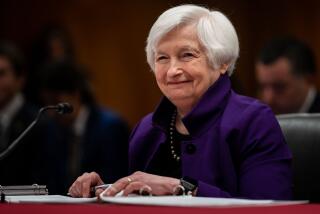Political Interest Is Overdue on Debt Crisis
- Share via
Citicorp, the nation’s largest bank holding company, has shaken up the U.S. banking system and the already strained process for handling Third World debt by putting aside $3 billion against the possibility of future losses from its multibillion portfolio of loans to developing countries. In practice this is roughly the equivalent of recognizing that most of these loans--to countries as different as the Philippines, Brazil and Nigeria--are now worth, on average, about 75 cents on the dollar. The new reserve will mean a loss to Citicorp of around $1 billion this year.
Major American banks have been reluctant to recognize that the value of their loans to highly indebted countries had fallen, even as many of those countries struggled with high interest rates, lower export earnings and the legacy of past economic mismanagement. The banks preferred to sustain the fiction of full value by making new loans to cover at least part of the interest payments that came due, while countries’ hard-earned surpluses on trade covered the balance. The inevitable, but illogical, result was that, as the debt crisis lingered, countries’ indebtedness grew.
Escape from this vicious circle was possible only if a country sustained a trade surplus well in excess of its interest payments, or if it refused to make full payments. Few countries have been able to do the former; several weeks ago Brazil, the Third World’s largest debtor, at least temporarily chose the latter.
Citicorp’s action may have been a reaction to the Brazilian situation or a belated recognition that the existing debt management strategy would sooner or later collapse. The decision to set aside billions of dollars against possible losses, which other banks are likely to follow (as Chase Manhattan did last week), almost certainly breaks the circle of new loans for interest on old debt. How can a bank justify making new loans to a borrower when it has acknowledged that existing loans to that borrower are not worth their face value?
European banks that have been building reserves for several years were increasingly reluctant participants in the refinancing process; smaller banks in the United States and elsewhere, which probably should not have been making loans in the developing world in the first place, have been trying to drop out. Although Citicorp has indicated that it will go ahead with a pending loan to Argentina, few banks anywhere will be prepared to commit net new money to thehighly indebted countries, at least within the framework that has prevailed for the last five years.
Thus, the Citicorp action signals the beginning of a new phase of the debt crisis. It will be characterized by a new realism, a new willingness to confront and deal with facts rather than simply to hope that things will get better if the problem is pushed into the future. In the process creditors, debtors and international financial officials will also eventually have to acknowledge what they have thus far avoided: that countries can be over-indebted, and that old creditors (the commercial banks) are not going to be principal sources of new capital flows.
Citicorp’s admission that its loan portfolio is not worth 100 cents on the dollar is only the start of wisdom; recognition of why it is worth less is also important. The economic and political reality is that some countries have more debt than they can possibly service. Just as companies or individuals can borrow too much and require debt relief, so can--and have--countries. As a group, commercial banks are unlikely to provide new loans to these countries. The banks have too many loans already and too many better things to do with their money.
Recognition of all three realities--that the debt is not worth full value, that some countries need debt relief and that the banks will not (probably should not) be the source of new lending--necessarily presents a considerable challenge to the leaders of the United States and other industrial countries. On the one hand, they must preserve the integrity of the international banking system; on the other, restoring realistic growth prospects in the Third World should be both a political and economic priority. (Our security depends on stability and the nurturing of fragile democracies, and we need export markets.) These are not incompatible objectives, but they will require more creativity--and, inevitably, more public monies--than our leaders have yet devoted to this problem.
Citicorp and much of the American banking system will eventually emerge stronger from their encounter with reality. Bankers, however, may find that a 25% discount still overestimates how much their loans are worth, and some big banks may not be able to survive, although the system will. The debt crisis will almost certainly get worse before it gets better.
The question now is: Can the crisis be managed in a way that ultimately enhances American economic stability and prospects, or will Washington cling to one of its favorite fictions--that the debt crisis is largely a private sector problem to be resolved by the private sector. One hopes that political and financial leaders in Washington will be prepared to follow Citicorp and deal instead with reality.
More to Read
Inside the business of entertainment
The Wide Shot brings you news, analysis and insights on everything from streaming wars to production — and what it all means for the future.
You may occasionally receive promotional content from the Los Angeles Times.










